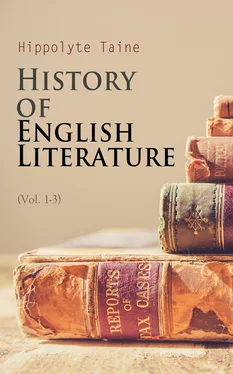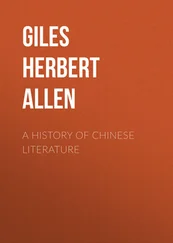SECTION II.—Manners of the Sixteenth Century
Table of Contents
These are but externals; let us try to advance further, to observe the passions, the bent of mind, the inner man: it is this inner state which raised and modelled the drama, as everything else; invisible inclinations are everywhere the cause of visible works, and the interior shapes the exterior. What are these townspeople, courtiers, this public, whose taste fashions the theatre? what is there peculiar in the structure and condition of their minds? The condition must needs be peculiar; for the drama flourishes all of a sudden, and for sixty years together, with marvellous luxuriance, and at the end of this time is arrested so that no effort could ever revive it. The structure must be peculiar; for of all theatres, old and new, this is distinct in form, and displays a style, action, characters, an idea of life, which are not found in any age or any country beside. This particular feature is the free and complete expansion of nature.
What we call nature in men is, man such as he was before culture and civilization had deformed and reformed him. Almost always, when a new generation arrives at manhood and consciousness, it finds a code of precepts impose on it with all the weight and authority of antiquity. A hundred kinds of chains, a hundred thousand kinds of ties, religion, morality, good breeding, every legislation which regulates sentiments, morals, manners, fetter and tame the creature of impulse and passion which breathes and frets within each of us. There is nothing like that here. It is a regeneration, and the curb of the past is wanting to the present. Catholicism, reduced to external ceremony and clerical chicanery, had just ended; Protestantism, arrested in its first gropings after truth, or straying into sects, had not yet gained the mastery; the religion of discipline was grown feeble, and the religion of morals was not yet established; men ceased to listen to the directions of the clergy, and has not yet spelled out the law of conscience. The church was turned into an assembly-room, as in Italy; the young fellows came to St. Paul's to walk, laugh, chatter, display their new cloaks; the thing had even passed into a custom. They paid for the noise they made with their spurs, and this tax was a source of income to the canons; [397]pickpockets, loose girls, came there by crowds; these latter struck their bargains while service was going on. Imagine, in short, that the scruples of conscience and the severity of the Puritans were at that time odious and ridiculed on the stage, and judge of the difference between this sensual, unbridled England, and the correct, disciplined, stiff England of our own time. Ecclesiastical or secular, we find no signs of rule. In the failure of faith, reason had not gained sway, and opinion is as void of authority as tradition. The imbecile age, which has just ended, continues buried in scorn, with its ravings, its verse-makers, and its pedantic text-books; and out of the liberal opinions derived from antiquity, from Italy, France, and Spain, everyone could pick and choose as it pleased him, without stooping to restraint or acknowledging a superiority. There was no model imposed on them, as nowadays; instead of affecting imitation, they affected originality. [398]Each strove to be himself, with his own oaths, peculiar ways, costumes, his specialties of conduct and humor, and to be unlike everyone else. They said not, "So and so is done," but "I do so and so." Instead of restraining, they gave free vent to themselves. There was no etiquette of society; save for an exaggerated jargon of chivalresque courtesy, they are masters of speech and action on the impulse of the moment. You will find them free from decorum, as of all else. In this outbreak and absence of fetters, they resemble fine strong horses let loose in the meadow. Their inborn instincts have not been tamed, nor muzzled, nor diminished.
On the contrary, they have been preserved intact by bodily and military training; and escaping as they were from barbarism, not from civilization, they had not been acted upon by the innate softening and hereditary tempering which are new transmitted with the blood, and civilize a man from the moment of his birth. This is why man, who for three centuries has been a domestic animal, was still almost a savage beast, and the force of his muscles and the strength of his nerves increased the boldness and energy of his passions. Look at these uncultivated men, men of the people, how suddenly the blood warms and rises to their face; their fists double, their lips press together, and those vigorous bodies rush at once into action. The courtiers of that age were like our men of the people. They had the same taste for the exercise of their limbs, the same indifference toward the inclemencies of the weather, the same coarseness of language, the same undisguised sensuality. They were carmen in body and gentlemen in sentiment, with the dress of actors and the tastes of artists. "At fourtene," says John Hardyng, "a lordes sonnes shalle to felde hunte the dere, and catch an hardynesse. For dere to hunte and slea, and see them blede, ane hardyment gyffith to his courage.... At sextene yere, to werray and to wage, to juste and ryde, and castels to assayle... and every day his armure to assay in fete of armes with some of his meyne." [399]When ripened to manhood, he is employed with the bow, in wrestling, leaping, vaulting. Henry VII's court, in its noisy merriment, was like a village fair. The king, says Holinshed, exercised himself "dailie in shooting, singing, dancing, wrestling, casting of the barre, plaieing at the recorders, flute, virginals, in setting of songs, and making of ballads." He leaps the moats with a pole, and was once within an ace of being killed. He is so fond of wrestling, that publicly, on the field of the Cloth of Gold, he seized Francis I in his arms to try a throw with him. This is how a common soldier or a bricklayer nowadays tries a new comrade. In fact, they regarded gross jests and brutal buffooneries as amusements, as soldiers and bricklayers do now. In every nobleman's house there was a fool, whose business it was to utter pointed jests, to make eccentric gestures, horrible faces, to sing licentious songs, as we might hear now in a beer-house. They thought insults and obscenity a joke. They were foul-mouthed, they listened to Rabelais's words undiluted, and delighted in conversation which would revolt us. They had no respect for humanity; the rules of proprieties and the habits of good breeding began only under Louis XIV, and by imitation of the French; at this time they all blurted out the word that fitted in, and that was most frequently a coarse word. You will see on the stage, in Shakespeare's "Pericles," the filth of a haunt of vice. [400]The great lords, the well-dressed ladies, speak billingsgate. When Henry V pays his court to Catherine of France, it is with the coarse bearing of a sailor who may have taken a fancy to a sutler; and like the tars who tattoo a heart on their arms to prove their love for the girls they left behind them, there were men who "devoured sulphur and drank urine" [401]to win their mistress by a proof of affection. Humanity is as much lacking as decency. [402]Blood, suffering, does not move them. The court frequents bear and bull baitings, where dogs are ripped up and chained beasts are sometimes beaten to death, and it was, says an officer of the palace, "a charming entertainment." [403]No wonder they used their arms like clodhoppers and gossips. Elizabeth used to beat her maids of honor, "so that these beautiful girls could often be heard crying and lamenting in a piteous manner." One day she spat upon Sir Mathew's fringed coat; at another time, when Essex, whom she was scolding, turned his back, she gave him a box on the ear. It was then the practice of great ladies to beat their children and their servants. Poor Jane Grey was sometimes so wretchedly "boxed, struck, pinched, and ill-treated in other manners which she dare not relate," that she used to wish herself dead. Their first idea is to come to words, to blows, to have satisfaction. As in feudal times, they appeal at once to arms, and retain the habit of taking the law in their own hands, and without delay. "On Thursday laste," writes Gilbert Talbot to the Earl and Countess of Shrewsbury, "as my Lorde Rytche was rydynge in the streates, there was one Wyndam that stode in a dore, and shotte a dagge at him, thynkynge to have slayne him. ... The same daye, also, as Sr John Conway was goynge in the streetes, M r.Lodovyke Grevell came sodenly upon him, and stroke him on the hedd w tha sworde.... I am forced to trouble yo rHonors w ththes tryflynge matters, for I know no greater." [404]No one, not even the queen, is safe among these violent dispositions. [405]Again, when one man struck another in the precincts of the court, his hand was cut off, and the arteries stopped with a red-hot iron. Only such atrocious imitations of their own crimes, and the painful image of bleeding and suffering flesh, could tame their vehemence and restrain the uprising of their instincts. Judge now what materials they furnish to the theatre, and what characters they look for at the theatre. To please the public, the stage cannot deal too much in open lust and the strongest passions; it must depict man attaining the limit of his desires, unchecked, almost mad, now trembling and rooted before the white palpitating flesh which his eyes devour, now haggard and grinding his teeth before the enemy whom he wishes to tear to pieces, now carried beyond himself and overwhelmed at the sight of the honors and wealth which he covets, always raging and enveloped in a tempest of eddying ideas, sometimes shaken by impetuous joy, more often on the verge of fury and madness, stronger, more ardent, more daringly let loose to infringe on reason and law than ever. We hear from the stage as from the history of the time, these fierce murmurs: the sixteenth century is like a den of lions.
Читать дальше












